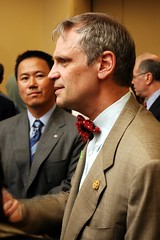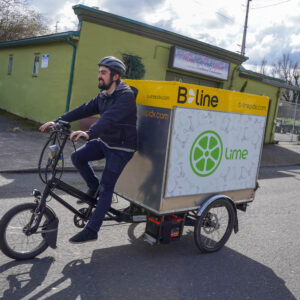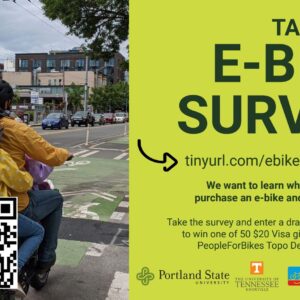
National Bike Summit. (Kozo
Shimano is in the background).
(Photo © J. Maus)
In advance of next week’s National Bike Summit, this morning Congressman Earl Blumenauer (D-OR) introduced House Congressional Resolution 305, “Recognizing the importance of bicycling in transportation and recreation.”
Blumenauer refers to the resolution as the “National Bike Bill” (read full text below).
Co-sponsored by Congressman James Oberstar (D-MN), the resolution has also been made one of the four key priorities that will get the backing of hundreds of advocates across the country when the League of American Bicyclists hosts the National Bike Summit in Washington DC next week.
In an issue paper distributed by the League in advance of the Summit they write that the resolution, “calls on the United States Congress to adopt a national bicycling strategy to fully realize the incredible benefits of getting more people bicycling, more safely, more often,” and it urges lawmakers to ensure “wise use of the considerable Federal investment in transportation infrastructure, and that expanded funding for bicycling and walking programs is desirable and important.”
“Whereas a national network of interconnected urban and rural bikeways can provide valuable community benefits, including low or no-cost recreation and alternative transportation options for people of all ages and abilities;”
–from the text of the resolution
As evidence of why this resolution is necessary, the League points to a recent report by the National Surface Transportation Policy and Revenue Commission on the future direction and financing of the nation’s transportation system that failed to mention bicycling. The League says “there were more pictures of ducks and deer than bicyclists,” in the pages of the report. The League also points out that recently passed energy and climate change legislation “failed to offer a single program or project to encourage or increase bicycle use.”
The resolution will have no binding policy outcomes but is considered to be an excellent way to raise awareness of an issue in the build up to significant pieces of legislation (like the re-authorization of the Transportation Bill in 2009). As a top priority at the National Bike Summit, all attendees will encourage their congressional representatives to sign the resolution during the event’s full day of lobbying on Capitol Hill.
I’ll be covering this and all the national bike advocacy news live from DC all next week.
For more on Blumenauer’s National Bike Bill, download a PDF of the League of American Bicyclists issue paper.
Read the full text of the resolution on the Library of Congress website, or read pasted version below.
110th CONGRESS
2d Session
H. CON. RES. 305
Recognizing the importance of bicycling in transportation and recreation.
IN THE HOUSE OF REPRESENTATIVES
February 28, 2008
Mr. BLUMENAUER (for himself and Mr. OBERSTAR) submitted the following concurrent resolution; which was referred to the Committee on Transportation and Infrastructure
—-
CONCURRENT RESOLUTION
Recognizing the importance of bicycling in transportation and recreation.
Whereas a national transportation system conducive to bicycling produces enriched health, reduced traffic congestion and air pollution, economic vitality, and an overall improved quality of living is valuable for the Nation;
Whereas by dramatically increasing levels of bicycling in United States cities tangible and intangible benefits to the quality of life for cities and towns across the country will be realized;
Whereas we now live in a Nation with 300 million people, and that number is expected to grow to 365 million by 2030 and to 420 million by 2050 with the vast majority of that growth occurring in urban areas with limited ability to accommodate increased motor vehicle travel;
Whereas since 1980, the number of miles Americans drive has grown 3 times faster than the United States population, and almost twice as fast as vehicle registrations;
Whereas one-third of the current population does not drive due to age, disability, ineligibility, economic circumstances, or personal choice;
Whereas the United States is challenged by an obesity epidemic, 65 percent of United States adults are either overweight or obese, and 13 percent of children and adolescents are overweight, due in large part to a lack of regular activity;
Whereas the Center for Disease Control estimates that if all physically inactive Americans became active, we would save $77 billion in annual medical costs;
Whereas over 753 of our Nation’s Mayors have signed onto the climate protection agreement of the United States Conference of Mayors urging the Federal Government to enact policies and programs to meet or exceed a greenhouse gas emission reduction target of a 7 percent reduction from 1990 levels by 2012;
Whereas the transportation sector contributes one-third of the greenhouse gas emissions in the United States and passenger automobiles and light trucks alone contribute 21 percent;
Whereas bicycle commuters annually save on average $1,825 in auto-related costs, reduce their carbon emissions by 128 pounds, conserve 145 gallons of gasoline, and avoid 50 hours of gridlock traffic;
Whereas the greatest potential for increased bicycle usage is in our major urban areas where 40 percent of trips are 2 miles or less and 28 percent are less than one mile;
Whereas in 1969 approximately 50 percent of children in the United States got to school by walking or bicycling, but in 2001 only 15 percent of students were walking or bicycling to school;
Whereas as much as 20 to 30 percent of morning traffic is often generated by parents driving their children to schools, and in the United States, motor vehicle crashes are the leading cause of death for children ages 3 to 14;
Whereas many public agencies in cities are using bicycles to deliver critical municipal services, for example, more than 80 percent of police departments serving populations of 50,000 to 249,999 and 96 percent of those serving more than 250,000 residents now have routine patrols by bicycle;
Whereas surveys show that a majority of people want to ride and walk more but are dissuaded by concern over traffic danger and other barriers, and case studies have shown that when those barriers to bicycling are removed, people start riding;
Whereas investment used for improvements for bicyclists and promoting bicycle use resulted in the quadrupling of bicycle use in Portland, Oregon, since 1994 and a recent report to Congress on the nonmotorized transportation pilot program reveals that 19.6 percent of trips in Minneapolis, Minnesota, are made by biking and walking, reflecting the benefit of initial investments in nonmotorized infrastructure;
Whereas the American bicyclist generates enormous economic returns, in 2006, the national bicycling economy contributed $133 billion to the United States economy, supported nearly 1.1 million jobs across the United States, generated $17.7 billion in annual Federal and State tax revenue, produced $53.1 billion annually in retail sales and services, and provided sustainable growth in rural communities;
Whereas a national network of interconnected urban and rural bikeways can provide valuable community benefits, including low or no-cost recreation and alternative transportation options for people of all ages and abilities;
Whereas mountain biking is an environmentally friendly, healthy nonmotorized outdoor recreation activity that encourages young people to experience our natural world, and engenders community support for preservation of open space;
Whereas each year major charity bike rides in communities across the country raise in excess of $100 million for critical medical research to find cures for life-threatening diseases;
Whereas 57 million adults in the United States bicycle each year, and bicycling and walking currently account for nearly 10 percent of trips and 13 percent of traffic fatalities, yet less than 2 percent of Federal transportation safety funding is currently spent to make bicycling and walking safer; and
Whereas communities across the United States are seeking ways to reduce traffic congestion, improve air quality, increase the safety of their neighborhoods, and decrease petroleum dependence, bicycles offer a simple, healthy, energy-saving alternative to driving: Now, therefore, be it
Resolved by the House of Representatives (the Senate concurring), That the Congress–
(1) recognizes that increased and safe bicycle use for transportation and recreation is in the national interest;
(2) supports policies that–
(A) establish national target levels for increased bicycle use, reduce the number of motor vehicle miles traveled (VMT), improve bicycle safety to be achieved within a specific timeframe, and collect data needed to monitor progress;
(B) increase intermodal travel between public transportation and bicycles;
(C) provide incentives for State and local governments to adopt and implement complete street policies designed to accommodate all users, including motorists, pedestrians, bicyclists, transit riders, and people of all ages and abilities;
(D) encourage bicycle use in communities where significant segments of the population do not drive and where short trips are most common;
(E) expand funding for core Federal transportation programs that support non-motorized infrastructure, education, and encouragement programs by–
(i) safeguarding existing funding sources for nonmotorized transportation from inequitable treatment in the Federal transportation funds rescission process;
(ii) supporting funding for core Federal transportation programs that support nonmotorized travel, including transportation enhancements, safe routes to school, and recreational trails; and
(iii) ensuring that highway safety improvement program funds are spent in proportion to the percentage of bicyclist and pedestrian fatalities in each State;
(F) facilitate the development of a coordinated system of United States bicycle routes across the country that cross state borders and connect metropolitan regions;
(G) create bicycle-friendly Federal land protection legislation, such as national recreation areas, to encourage regulations and management practices for mountain biking as an environmentally friendly nonmotorized use of natural surface trails;
(H) provide flexibility in Federal transportation law that would speed up the delivery of nonmotorized infrastructure without sacrificing necessary environmental protections;
(I) provide Federal tax or funding incentives to–
(i) States that adopt motor vehicle laws that protect the rights of bicyclists to share the road;
(ii) businesses that expand bicycle-friendly programs for their employees;
(iii) the health care industry to develop more member discount programs, that target increased physical activity such as bicycling and walking; and
(iv) provide bicycle commuters the transportation fringe benefits currently provided to people who commute by car or mass transit; and
(J) build upon the `Green the Capitol Initiative’ as a model, create and provide an environmentally sustainable and healthy working environment for employees that includes the promotion of bicycling as a transportation alternative;
(3) encourages the Department of Transportation to provide leadership and coordination by reestablishing the Federal bicycle task force to include representatives from all relevant Federal agencies.







Thanks for reading.
BikePortland has served this community with independent community journalism since 2005. We rely on subscriptions from readers like you to survive. Your financial support is vital in keeping this valuable resource alive and well.
Please subscribe today to strengthen and expand our work.
The Revolution Will Not Be Motorized!
i sure hope this works out
I will breath deeply and evenly and cross my fingers in anticipation. The bicycle is becoming part of the agenda.
\”The resolution will have no binding policy outcomes \”
Blah blah blah.
Well I guess we have to start somewhere.
Great, when it comes to populist movements, nothing says a mainstream better than a bow tie. C\’mon Earl, don\’t make us look like the Orville Redendbacker fan club.
Coyote –
Bow tie aside, Earl is one healthy looking guy, and that speaks to the benefits of biking as much as anything he wears.
Sure they\’ll make fun. And keep lining up at the pump until the last drop.
This reads like poetry! But will this get killed by the petroleum lobbies? I fully support making this a federal issue, but let\’s get this stuff going locally, so we can show the world how good a city really can be
Earl gets things done, bow tie or not.
He\’s the best chance, voice and player we have in a position within the mainstream power structure. I\’m working with his office right now on a major national campaign project connected to this national bill and bike movement right now. We\’ll be the masses, the public outcry… It\’s gonna be fun, dynamic, offer up a lot of participation, have tangible outcomes, heck, it might even get me shot through the head by powerful corporate entities, good times.
We\’ll roll the campaign out first on this site in a week or two.
Look, many know in their gut and from what they see every day that this country is in dire straits because of our energy/transportation choices, the suburbs were a mistake, car companies lie through their teeth (green cars, come on down and buy another subaru and save the planet… please!) and bicycles are a major part of the answer, not the entire answer to a safer, cleaner more humane society, but a big chunk of the answer. Some powerful people making bank on the current structure want to hold tight to the status quo. We know we\’re up against powerful forces, but there\’s still a lot of fight left in me so stay tuned… and get out and ride in this fantastic weather. As Bill Murray might have told a certain groundhog in a bike dominated society: \”Don\’t pedal angry!\” Keep the faith and enjoy yourself on that bike, regardless if we haven\’t achieved uptoia yet, Believe me, you could be pedaling in Florida instead of Portland.
BTW: A.O aka Chris Heap has revealed our slogan for this campaign already – back in the first post:
The Revolution Will Not Be Motorized!
Hey now, don\’t be dissing the \’burbs…
Frankly, I\’d rather live and bike down here in Tigard than in Portland. Even with our lack of infrastructure.
KT – I actually have a soft spot for the burbs, spent 2nd part of childhood in a Florida cul de sac – was dissing the burbs in terms of how car culture allowed for5 them to be possible, allowing for burning of a ton more oil back and forth, and in most of the country, no mass transit to reduce the number of single occupancy cars streaming back and forth. I have other qualms with the monoculture of architecture etc. but as a 12yr old, I did enjoy the close access to several malls. Can\’t tell you how many times I/bike almost got run over though. Time I went over the hood of a car while carrying my collection of Boston and Rush albums back from the Record Bar.
Oh yeah, I totally know what you\’re talking about there… It\’s that whole \”if people lived where they worked\” thing.
I grew up in a rural area near an urban area; we weren\’t technically West Linn, Tualatin, Wilsonville, or Lake O… and forget about walking or riding bikes to school! 🙂 I kinda like the burbs in comparison, but don\’t because of all the people.
But, since these days a lot of single-occupancy car trips are 5 miles or less in general, I don\’t know if the \’burbs are a cause, symptom, or side effect. 🙂
Plenty of people making questionable transportation choices in urban areas, for sure. 50 percent of car travel is to places 3 miles or less. All those trips ain\’t happening in teh burbs. 😉
This made me squeal when they reported it on npr. I am really excited and super hopeful and rather want to campaign A LOT, EVERYWHERE to do my best to help it pass. WHEE!
You\’re all still alive. I may then conclude, that you all are either not riding bicycles in traffic, or the environment you ride in is perfectly safe? Which is it? If you don\’t ride a bike, then what do you care about yet another tax-payer funded, utopianist excursion into the absurd? If you do ride a bike, and you\’re still here, then what\’s the problem?
Lead by example, not civic group. This whole thing would be a much easier sell if you would remain focused on your own contribution, instead of having your noses where they don\’t belong.
None of you leave a smaller carbon-footprint on this planet than I, not a single one of you. So save your presumptions about my voter registration status. Now, can we maybe get some food in everybody\’s belly before we start blowing tax-payer resources on Science-Fiction Fantasies? Sheez, and many of you call yourselves liberals.
Vance, my man, you should really get that condition checked. Otherwise, sleep with the lights on. It\’s gotta be a scary place inside your head, all alone in the dark with those thoughts.
wow, vance is one smart guy. not only does he know that i apparently don\’t ride a bike (because i am alive and typing) but he even knows my carbon footprint.
that\’s amazing!
as far as sticking my nose where it doesn\’t belong, how about a bike lane here and there? then i can bike to work safely and you can pay less for driving your polluting hunk of metal around. not only that, but my nose won\’t be in your traffic jam, making it move that much quicker! your productivity will skyrocket and uncle Ben will be oh so happy!